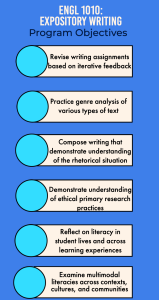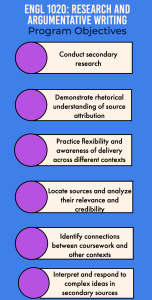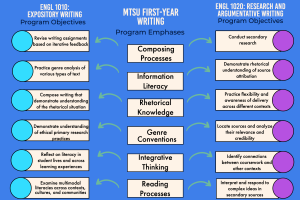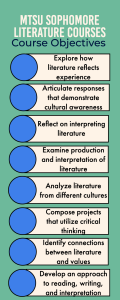Program Overview
3 Course Objectives
ENGL 1010: Expository Writing, ENGL 1020: Research and Argumentative Writing, ENGL 2020: Themes in Literature, and ENGL 2030: Survey of Literature are all approved True Blue Core courses. The course objectives for each class are articulated below. The True Blue Core will officially launch in Summer 2024.
First-Year Writing and MTSU
The First-Year Writing sequence includes ENGL 1010: Expository Writing and ENGL 1020: Research and Argumentative Writing. ENGL 1020 builds on the knowledge and skills students build in ENGL 1010 in regard to Composing Processes, Information Literacy, Rhetorical Knowledge, Genre Conventions, Integrative Thinking, and Reading Processes.
ENGL 1010 Course Objectives
The six course objectives directly align with the three assessable Student Learning Outcomes (SLOs) for the True Blue Core A1: Written Communication category. Our objectives map to the SLOs as follows:
 True Blue Core SLO: Context of and Purpose for Writing
True Blue Core SLO: Context of and Purpose for Writing
Aligned ENGL 1010 Course Objectives:
Examine multimodal literacies across contexts, cultures, and communities, including academic disciplines and public audiences (Reading processes)
Reflect on literacy in student lives and across learning experiences (Integrative Thinking)
True Blue Core SLO: Content Development
Aligned ENGL 1010 Course objectives:
Compose writing tasks that demonstrate understanding of the rhetorical situation (Rhetorical Knowledge)
Revise writing assignments based on iterative feedback and make appropriate decisions about content, form, and presentation (Composing Processes)
True Blue Core SLO: Genre and Disciplinary Conventions
Aligned ENGL 1010 Course objectives:
Demonstrate understanding of ethical primary research practices (Genre Conventions)
Practice genre analysis of various types of text—print, digital, and audio (Information Literacy)
ENGL 1020 Objectives
The six course objectives directly align with the three assessable Student Learning Outcomes (SLOs) for the True Blue Core Information Literacy category. Our objectives map to the SLOs as follows:
 True Blue Core SLO: Information Literacy Scope
True Blue Core SLO: Information Literacy Scope
ENGL 1020 Aligned Course Objectives:
Conduct secondary research that relies on recursive relationships between reading, writing, and reflection (Composing Processes)
Practice flexibility and awareness of effective delivery across different audiences, contexts, and genres (Rhetorical Knowledge)
True Blue Core SLO: Information Literacy Sources
ENGL 1020 Aligned Course Objectives:
Locate sources and analyze their relevance and credibility (Genre Conventions)
Demonstrate rhetorical understanding of source attribution (Information Literacy)
True Blue Core SLO: Information Literacy Comprehension & Use
ENGL 1020 Aligned Course Objectives:
Interpret and respond to complex ideas in secondary sources (Reading)
Identify connections between coursework and other academic and external contexts (Integrative Thinking)
Sophomore Literature at MTSU
ENGL 2020 and ENGL 2030 fulfill the True Blue Core requirements C1 Intercultural Understanding.
Upon completion of classes that focus on Intercultural Understanding, “Students will demonstrate intercultural understanding by building knowledge, self-awareness, and conceptions of global and intercultural perspectives, values, systems, and attitudes.” In particular, the category is assessed through the following Student Learning Outcomes (SLOs): Cultural Self-Awareness, Knowledge of Diverse Cultural Frameworks, and Empathy and Openness. Engaged, careful reading of literature directly addresses these SLOs. In ENGL 2020 and ENGL 2030, students are invited to Know Thyself (develop cultural awareness), Know Others (develop knowledge of diverse cultural frameworks), and Apply Knowledge of the Self and Others (demonstrate empathy and openness).
The alignment of these course objectives and True Blue Core SLOs is detailed below:
SLO: “Articulates insights into own cultural rules and perspectives (e.g. seeking complexity; aware of how their experiences have shaped these rules, and how to recognize and respond to cultural perspectives, resulting in a shift in self-description).”
- Explore how literature reflects, informs, and shapes both personal and collective experience
- Articulate cogent responses to literature that demonstrate cultural awareness and understanding
- Reflect on how reading, writing, and interpreting literature initiates and contributes to cultural and social conversations
SLO: “Demonstrates sophisticated understanding of and curiosity about the complexity of elements important to members of other cultures in relation to history, values, politics, communication styles, aesthetic expression, economy, or beliefs and practices and how these shape interactions and inequalities within and across cultures.”
- Examine how the production and interpretation of literature is shaped by historical, cultural, and social contexts
- Analyze how texts from different cultures, movements, and time periods employ narrative and stylistic strategies to convey complex ideas and meanings
- Compose projects (written, digital, or audio) that utilize critical thinking, analysis, and research to situate literature within diverse cultural and conceptual frameworks
SLO: “Interprets intercultural experience from the perspectives of own and more than one worldview and perspective. Demonstrates the ability to act in a supportive manner that recognizes the feelings of another group.”
- Identify connections between texts and the values, experiences, and practices of multiple cultures
- Develop an approach to reading, writing, and interpretation that demonstrates an understanding of human experience from multiple cultural vantage points



